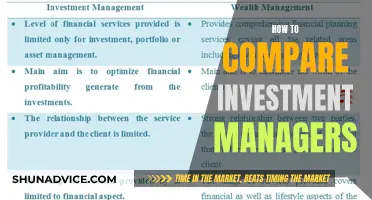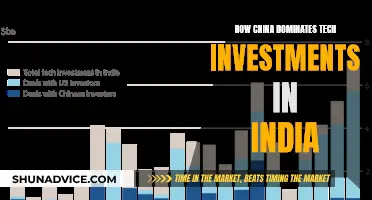
With inflation eating away at savings, it's important to find the right place to keep your money. While it's always a good idea to have some cash on hand for emergencies, there are a number of options for those looking to invest their savings safely.
One option is to put your money in a high-yield savings account. These accounts are insured by the Federal Deposit Insurance Corporation (FDIC), which means the government will compensate you for any losses of up to $250,000. While these accounts are considered safe, there is a risk of losing purchasing power over time due to inflation if interest rates are too low.
Another option is to invest in certificates of deposit (CDs). CDs are also FDIC-insured and offer a higher interest rate than savings accounts. However, there is a risk of losing some of the interest earned if you withdraw the money before the maturity date.
Money market accounts are similar to savings accounts and CDs, but they usually offer better rates and may allow you to write a limited number of checks each month. On the other hand, there is usually a limit of six transactions per month, and exceeding this limit may result in fines or account closure.
For those looking for even safer options, U.S. Treasury securities, such as Treasury bills, notes, and bonds, are considered to be among the safest investments available. These are backed by the full faith and credit of the U.S. government and offer fixed terms and interest rates.
Other safe investment options include Treasury Inflation-Protected Securities (TIPS), Series I savings bonds, investment-grade corporate bonds, and money market mutual funds.
It's important to remember that while these investments are generally safe, there is always some level of risk involved, and it's crucial to do your own research and consult a financial professional before making any investment decisions.
| Characteristics | Values |
|---|---|
| Liquidity | High |
| Risk | Low |
| Returns | Low |
| Accessibility | High |
| Inflation protection | Yes |
| FDIC insurance | Up to $250,000 |
| Investment types | High-yield savings accounts, money market funds, short-term certificates of deposit, Series I savings bonds, Treasury bills, notes, bonds and TIPS, dividend-paying stocks, money market accounts, annuities, long-term certificates of deposit, long-term corporate bond funds, dividend stock funds, value stock funds, small-cap stock funds, REIT index funds, S&P 500 index funds, Nasdaq-100 index funds, rental housing, Treasury Inflation-Protected Securities, investment-grade corporate bonds, municipal bonds, S&P 500 index fund/ETF |
What You'll Learn

High-yield savings accounts
Benefits of High-Yield Savings Accounts
- Competitive APYs: High-yield savings accounts offer significantly higher interest rates than traditional savings accounts, allowing your savings to grow faster over time.
- Federal Insurance: High-yield savings accounts at most banks and credit unions are federally insured, typically up to $250,000 per depositor, providing security for your funds.
- Digital Tools: Many high-yield savings accounts offer digital tools that make it easy to manage your savings through your computer or mobile device.
- Accessibility: Funds in high-yield savings accounts are easily accessible, allowing you to withdraw your money whenever needed, although there may be a limit of six withdrawals per month.
Drawbacks of High-Yield Savings Accounts
- Variable Rates: The APYs on high-yield savings accounts are usually variable, meaning they can change at the bank's discretion.
- Withdrawal Limits: Some banks restrict withdrawals or transfers to a maximum of six per month.
- No Check-Writing: Checks generally cannot be written using high-yield savings accounts.
- Potential for Higher Returns Elsewhere: While high-yield savings accounts offer competitive rates, investing your money could potentially provide higher returns, albeit with greater risk.
- Limited Branch and ATM Access: Some online-only banks offering high-yield savings accounts may not provide branch or ATM access.
How to Choose a High-Yield Savings Account
When selecting a high-yield savings account, consider the following factors:
- APY: Look for accounts with competitive APYs to maximize the interest earned on your savings.
- No Monthly Fees: Choose an account that doesn't charge monthly service fees, which can eat into your savings.
- Accessibility: Ensure the account provides easy access to your money when needed, such as through ATM withdrawals or electronic transfers.
- Minimum Requirements: Pay attention to any minimum opening deposit or ongoing balance requirements. Some accounts may also require a minimum balance to earn the highest APY.
Examples of High-Yield Savings Accounts
- LendingClub Bank: LevelUp savings account with a special higher yield for depositing at least $250 monthly.
- EverBank: Performance Savings account with no minimum deposit or balance requirements.
- BrioDirect: High-Yield Savings account offering a competitive yield with a $5,000 minimum opening deposit.
- Bask Bank: Bask Interest Savings account with no minimum opening deposit or balance requirements.
- CIT Bank: Platinum Savings account offering a competitive yield with a $5,000 minimum balance requirement to earn the highest APY.
- American Express: High Yield Savings account with no monthly fee, minimum balance requirement, or minimum opening deposit.
- Forbright Bank: Growth Savings account with a competitive yield and no minimum balance or opening deposit requirements.
- Capital One: 360 Performance Savings account with no minimum deposit or balance requirements and no monthly fees.
- UFB Direct: UFB Portfolio Savings account with a competitive yield, no minimum balance or opening deposit requirements, and ATM access.
Hong Kong Savings: Best Places to Invest Your Money
You may want to see also

Money market funds
Here's a more detailed look at money market funds:
Types of Money Market Funds
- Government Funds: These funds primarily invest in cash, U.S. Treasury securities, and repurchase agreements that are backed by U.S. Treasury securities. They are considered extremely safe since they invest almost exclusively in government-backed securities.
- Prime or General Purpose Funds: In addition to government securities, prime funds also invest in commercial paper, certificates of deposit, short-term securities issued by domestic and foreign corporations, and various types of repurchase agreements.
- Municipal or Tax-Exempt Funds: These funds focus on investing in securities that are exempt from federal income tax. By investing in these tax-exempt securities, municipal funds aim to provide tax advantages to investors.
Benefits of Money Market Funds
- Low Risk: Money market funds are considered low-risk investments due to the nature of the securities they invest in. The likelihood of losing your principal investment is very low, making them suitable for risk-averse individuals.
- Liquidity: Money market funds are highly liquid, which means you can typically access your funds without incurring penalties. This feature makes them ideal for short-term financial goals or unexpected expenses.
- Current Income: These funds aim to provide a stable and consistent income stream in the form of interest payments. The income generated depends on the prevailing interest rates and the specific securities held by the fund.
- Diversification: Money market funds invest in a diverse range of short-term securities, reducing the concentration of risk associated with any single type of security or issuer.
Factors to Consider when Choosing a Money Market Fund
When selecting a money market fund, there are several key factors to keep in mind:
- Yield: Compare the yields offered by different funds to ensure you are getting a competitive return on your investment.
- Expense Ratio: The expense ratio represents the ongoing fees charged by the fund, which are deducted from your investment returns. Look for funds with lower expense ratios to maximize your net returns.
- Type of Fund: Consider whether you prefer a government, prime, or municipal money market fund. Each type has its own characteristics and risk profile, so choose the one that aligns with your investment goals and risk tolerance.
- Minimum Initial Investment: Some funds require a minimum initial investment, so be sure to consider this when deciding which fund to choose.
- Additional Fees: Pay close attention to any additional fees, such as mutual fund commissions or fees associated with specific fund families. These fees can eat into your returns, so it's important to understand them before investing.
In summary, money market funds offer a safe and stable investment option for individuals seeking low risk and consistent income. By investing in short-term, high-quality securities, these funds provide liquidity and diversification while maintaining a stable value per share. When choosing a money market fund, be sure to consider the yield, expense ratio, type of fund, minimum investment requirements, and any applicable fees to make an informed decision.
Investing Young: Better Than Saving?
You may want to see also

Short-term certificates of deposit
Short-term CDs are currently offering high interest rates, with the best CDs providing around 5.00% APY. This is because banks are trying to attract customers by offering more competitive rates for short-term CDs due to future economic uncertainty. Additionally, banks expect the Federal Reserve to cut rates in the future, which would cause bank account interest rates to drop. As a result, they are offering high-interest rates on short-term CDs to provide attractive, competitive offerings.
While short-term CDs offer flexibility, you'll need to be mindful of current economic conditions and CD rate fluctuations. Short-term CDs may also have lower interest rates than long-term CDs, as banks often reward savers who choose long-term options with higher rates.
When considering a short-term CD, it's important to think about whether you have a specific use for your money and choose a term that matches your needs. For example, if you need to buy a car in six months, a 6-month CD would be a suitable option. Additionally, consider setting up a CD ladder, which involves opening multiple CDs with different terms to diversify your CDs and have more flexibility in case you need to withdraw money.
Short-term CDs are a safe and accessible investment option, offering competitive interest rates and the flexibility to access your money in the short term. However, it's essential to stay informed about economic conditions and CD rate fluctuations to make the most of your investment.
Roth Accounts: Savings or Investment?
You may want to see also

Treasury bills, notes, bonds and TIPS
Treasury bills, notes, bonds, and TIPS are all US government debt instruments issued by the US Department of the Treasury to finance government spending. They are backed by the full faith and credit of the US government, which means that the government promises to raise money by any legally available means to repay them.
Treasury bills, or T-bills, are short-term investments that mature in one year or less. They are sold at a discount to their face value and don't pay periodic interest. Instead, investors receive the full face value at maturity, with the difference representing their return. T-bills are sold by single-price auctions held weekly, with the minimum purchase being $100.
Treasury notes, or T-notes, have maturities ranging from two to ten years. They pay interest every six months, with semi-annual interest payments but usually lower yields than T-bonds. The interest rate for a particular security is set at auction. T-notes are sold in increments of $100.
Treasury bonds, or T-bonds, offer the longest maturity, taking 20 to 30 years to mature. They have a coupon payment every six months like T-notes. T-bonds typically mature in 20 or 30 years and offer the highest coupons or interest, which are paid twice yearly. T-bonds are sold at monthly online auctions at TreasuryDirect, the US Treasury's securities platform, in multiples of $100.
Treasury Inflation-Protected Securities (TIPS) are inflation-indexed bonds whose principal value goes up or down depending on the direction of inflation. The coupon rate is fixed at the time of issuance, but the principal is adjusted periodically based on changes in the consumer price index (CPI). TIPS are available in medium and long-term securities, maturing in 5, 10, or 30 years. Like T-bonds and T-notes, the price and interest rate of TIPS are determined at auction.
Treasury securities are considered one of the safest investments due to the low likelihood of the US government defaulting on its debt. However, investors should be aware that selling these securities before maturity could result in a loss, depending on bond prices at the time of the sale.
Savings and Investment: Finding Equilibrium Balance
You may want to see also

Dividend-paying stocks
Misconceptions About Dividend-Paying Stocks
Firstly, it's important to dispel some common misconceptions about dividend-paying stocks:
- High Yield Is Not Always Best: A high dividend yield may not always be favourable as it could indicate that the company is returning a large portion of its profits to investors instead of reinvesting in its growth. A very high dividend yield could also be a sign of an impending dividend cut, which usually results in a decline in the stock price.
- Dividend Stocks Are Not Always Boring: While utility companies and slow-growth businesses are often associated with high dividend payouts, focusing solely on yield can make dividend stocks seem less exciting. However, it's important to consider other factors such as dividend growth metrics, the potential for dividend increases, and the financial health of the company.
- Dividend Stocks Are Not Always Safe: Dividend-paying stocks are often considered safe and reliable, especially those with a long history of annual dividend increases, known as "dividend aristocrats". However, it's crucial to evaluate how management uses dividends in their corporate strategy. Sometimes, companies may use dividends to placate investors when the stock isn't performing well, which could be a red flag.
Factors to Consider When Choosing Dividend-Paying Stocks
When selecting dividend-paying stocks, it's essential to look beyond the dividend yield and consider the following factors:
- Dividend Payout Ratio: This measures the percentage of profits a company pays out as dividends. A low payout ratio indicates that the company has more financial flexibility to reinvest in its business and support future dividend growth.
- Financial Flexibility: Assess the company's ability to generate free cash flow, maintain low capital expenditures, and manage debt levels. Avoid companies that take on excessive debt to maintain their dividend payments.
- Organic Growth: Look for companies with strong organic growth, such as increased sales, foot traffic, or margins. Be cautious if a company's growth relies heavily on high-risk investments or international expansion, as this could impact the stability of their dividend payments.
- Management's Commitment to Dividends: Evaluate how committed the company's management is to their dividend strategy. A history of consistent or increasing dividend payments, even during challenging economic periods, is a positive sign.
- Economic Moat or Competitive Advantage: Companies with a strong competitive advantage, often referred to as an "economic moat," tend to be more stable and reliable dividend payers. This could include factors such as strong brand recognition, proprietary technology, or a unique business model.
- Undervaluation: Consider buying dividend-paying stocks when they are undervalued or trading below their fair value. This allows you to acquire them at a lower price and potentially benefit from future price appreciation in addition to the dividend income.
Examples of Dividend-Paying Stocks
- JPMorgan Chase & Co. (JPM): One of the world's largest banks, with a strong credit card business and impressive lending growth prospects.
- Home Depot Inc. (HD): A leading home improvement retailer in North America, expected to benefit from homeowners' improvement projects.
- Procter & Gamble Co. (PG): A producer of well-known household consumer brands, such as Pampers, Tide, and Gillette, with a track record of product innovation and effective advertising.
- Johnson & Johnson (JNJ): A global leader in the pharmaceutical, medical device, and consumer healthcare industries, with a strong outlook for new drug launches and regulatory approvals.
- Merck & Co. Inc. (MRK): One of the world's largest pharmaceutical companies, known for cancer drug Keytruda and HPV vaccine Gardasil, with a strong pipeline of additional drug approvals.
- Coca-Cola Co.: A leading non-alcoholic beverage company that has demonstrated adaptability and successful brand management.
Final Thoughts
Equity Linked Savings Schemes: A Smart Investment Guide
You may want to see also
Frequently asked questions
Safe investments rarely provide high returns. However, a high-yield savings account is a good option for a safe place to keep your money with decent returns.
The three safest investments are savings accounts, certificates of deposit (CDs), and treasury bonds.
Safe investments work by minimising risk. This often means sacrificing liquidity and growth. Young investors can afford to take on more risk for potentially larger returns, while older investors may prefer safer options.
To decide which safe investments to choose, consider how much risk you can tolerate and how much liquidity you require. If stability is your main goal, options like US Treasury securities, money market mutual funds, and high-yield savings accounts are considered the safest.







